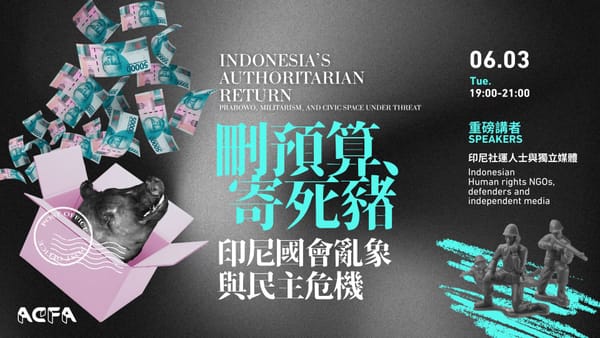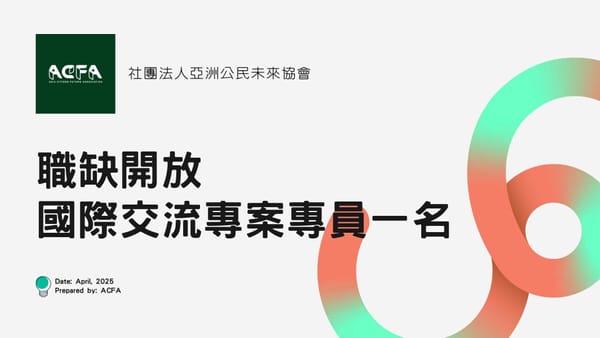Series Talk 1 | How can we do after people vote for candidate with authoritarian tendency in a democracy system?

(Anti-)normalizing reviving authoritarianism and shrinking civic space : cases of Indonesia, Philippines, and Taiwan.
Event Information
- Date 活動日期:2024/7/15
- Time 活動時間 : 19:00-21:00
- Location 活動地點 :Taipei (Location will be provided in the confirmation e-mail before the event)
- Language 語言 : English with Mandarin Interpretation Assistance
報名連結:https://forms.gle/Zzrw3xyY75nXPqzD6
In recent years, the Asia-Pacific face challenges of reviving authoritarianism, democratic backsliding, and shrinking civic space. In Indonesia and the Philippines, for example, former dictators and their legacies are gaining legitimate political power through democratic elections. In Taiwan, the new parliament that just gained power in early 2024 arbitrarily passed controversial bills that were deemed to cause threats to civic space and democracy, despite tens of thousands of people going on the streets to oppose such bills.
Why do these countries, after decades of democratization, still through democratic elections, elect political leaders that lead to the shrinking of civic space? How do these political leaders cause the closing of civic space in Indonesia, the Philippines, and Taiwan? While reviving authoritarianism and shrinking civic space gradually become a normality among the region, how does the civil society respond and resist? How do they connect and have dialogues with the public, to push for changes?
In this event, we invite civil society members from Indonesia, the Philippines, and Taiwan to discuss these issues and share how they defend civic space and stop threats of shrinking civic space and democratic backsliding from becoming a normality?
Speakers
Rizky Fariza Alfian is a staff member in International Advocacy at The Commission on Disappearances and Victims of Violence (KontraS), a non-governmental organization in Indonesia that focuses on human rights issues, particularly the protection of HRDs, addressing gross human rights violations, civil liberties, and victims of violence.
Ann Frances S. Quebec is one of the legal officers of IDEALS, Inc. As a human rights lawyer, her research and practice focus on transitional justice, the rights of persons deprived of liberty (PDLs), and gender rights.
Wang Si is the current deputy secretary-general at the Taiwan Association for Human Rights (TAHR). Her works focus on issues related to rights to freedom of assembly, freedom of association, and refugee issues.
Series Talk Introduction
The concept of ‘stretching’ is a contrast to the concept of ‘shrinking’. ‘Stretching Exercise’ symbolizes the continuous activism and organizing of Southeast Asian civil society organizations, movements, and human rights defenders amid the shrinking of civic space and repressive restrictions despite knowing the price for their activism. Their activism ensembles the warm-ups and stretching exercises, which are mild, but extends and defends the existing civic space. Such activism, in the context of shrinking civic space, maintains their momentum, and is very active and innovative.
Asia Citizen Future Association (ACFA) is dedicated to connect Taiwan and Southeast Asian civil society to develop collective strategies to defend civic space. Through the four events in the series, “Stretching Exercise: Defend Civic Space in Southeast Asia”, ACFA invites more than 10 speakers from Indonesia, Philippines, Thailand, Malaysia, Taiwan, and a Southeast Asian regional organization, to discuss how organizations and activists working on various issues continue their work and push for human rights developments through local, regional, cross-regional collaborations and cross-cutting strategies.




